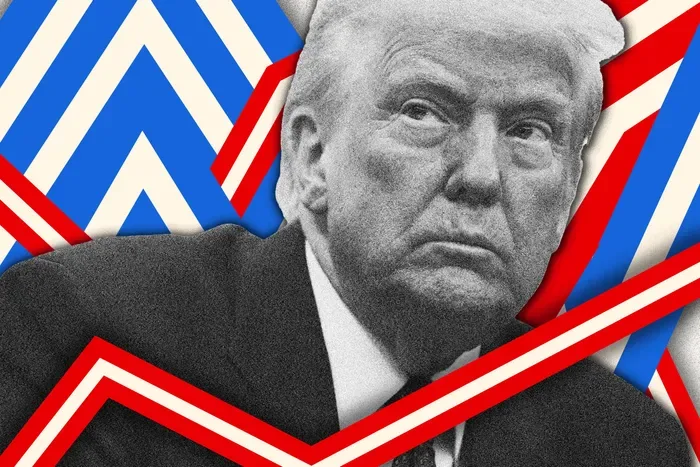Donald Trump’s approval ratings are slipping just a month into his second term. He started with a slightly positive rating, but recent polls indicate growing public dissatisfaction.
On January 24, FiveThirtyEight reported his approval at 49.7%, with 41.5% disapproval. By February 24, his approval had dropped to 48.5%, while disapproval climbed to 47%.
Public trust in Trump’s leadership is declining, and three key factors are driving the downturn:
- Economic Uncertainty: Inflation fears and tariff-driven price hikes are shaking consumer confidence.
- Policy Backlash: His proposals, including mass deportations and the push to end birthright citizenship, have sparked controversy.
- Concerns Over Power Dynamics: 55% of voters believe Elon Musk has too much influence in the Trump administration, creating skepticism about who is truly in charge.
Economic Approval Hits a New Low
The economy is proving to be Trump’s biggest challenge. According to a February Gallup poll, 54% of Americans disapprove of his handling of the economy, marking a sharp decline. The same poll found:
- 53% believe the economy is heading in the wrong direction.
- 76% are frustrated with rising energy costs.
- 92% say food prices are too high.
While some voters still blame the lingering effects of Joe Biden’s policies, most analysts agree that public sentiment will soon rest entirely on Trump’s economic management.
His tariffs, aimed at reducing foreign dependency, have instead triggered higher import costs, increasing prices on everyday goods.
This financial strain is eroding support among middle-class Americans. Trump’s immigration policies are splitting the nation.
While 50% of Americans support his overall immigration approach, his more aggressive measures—such as mass deportations—are less popular, with only 41% approval.
His stance on border security remains strong among his base, but independents and moderate conservatives worry about the economic and humanitarian consequences of mass deportations.
Critics argue that deporting millions could create labor shortages in key industries, worsening economic instability.
On the global stage, Trump’s policies have drawn mixed reactions. His approval ratings on foreign policy issues reflect deep divides:
- 46% support his immigration-related foreign policies.
- 44% approve of his international relations strategies.
- Only 40% back his positions on Israel-Palestine and Ukraine.
Trump’s tough stance on China and Russia has gained him some praise, but his unpredictable approach to diplomacy is causing unease among allies.
His decision to cut foreign aid programs and reduce U.S. involvement in NATO has fueled concerns about global stability.
Historically, presidents start their term with higher approval ratings before facing declines.
However, Trump’s current standing is among the weakest for a returning president.
His core supporters remain loyal, but the broader electorate is watching his economic decisions closely.
With rising costs, international tensions, and domestic policy debates heating up, Trump’s approval ratings could either rebound or sink further.
The next few months will be critical in shaping his presidency’s trajectory.







